#Eugene Ostashevsky
Quote
A translation is always a metamorphosis, its output never quite matching its input.
Eugene Ostashevsky, from his blog entry on his collection “The Feeling Sonnets”, published at Carcanet Press, July 6, 2022
123 notes
·
View notes
Text
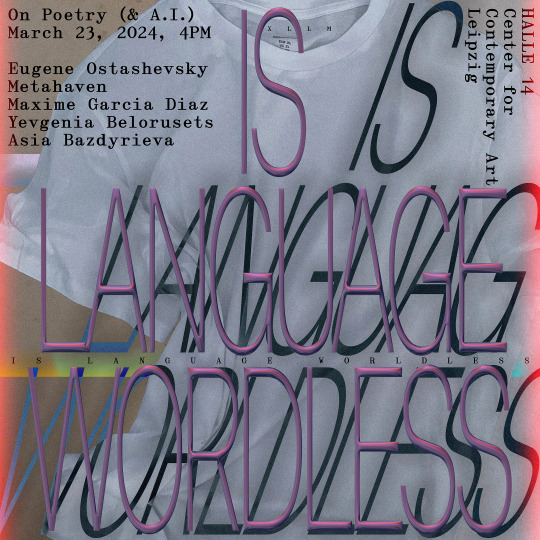
Is Language Wordless. On Poetry and Al–a symposium on poetry, language, embodiment, and LLMs with Asia Bazdyrieva, Yevgenia Belorusets, Maxime Garcia Diaz, Metahaven, and Eugene Ostashevsky–taking place in Leipzig at HALLE 14 on March 23, 2024, as part of the Leipzig Book Fair. In 2023, OpenAl, the company developing ChatGPT, published a list of human occupations that it predicts as endangered by the rise of Al. Topping the list of threatened vocations were poets. So, does a computationally optimized method for concatenating words–such as a Large Language Model–produce or understand poetry? For the Large Language Model, this may not matter as long as its output is aligned with its objectives. But as social and planetary technologies with transformative effects, Large Language Models have already entered a territory where their outputs are intentionally or accidentally conflated with human-made art or literature. Poets and screenwriters often emphasize embodied and situated understandings of poetics. Yet artificial intelligence points somewhere else. How might Al’s understanding of language affect the future of writing?
7 notes
·
View notes
Text
44
T, pinkie. R, ring. A, middle. N, index. S, thumb.
L, thumb. A, index. T, middle. O, ring. R, pinkie.
O translator’s hand, your nature is subdued to what you works in.
You are some dude or maybe some dudette. Your immersion is dire, like that of an au pair.
Philosophy begins in wonder but literature begins in ambivalence.
Where is your ambivalence, O translator? Here it is.
It is on the fence between words and words. They do not touch, being padded with felt.
It is at the crossing between words and words. They correspond by letters.
Knock, knock. Who’s there? The translator. Translator, are you going postal?
They who say you do not mean what you say do not mean what they say.
How do we come to mean what we say, say we. Really.
You have to hand it to the translator. The translator is two-handed.
O translator, artist of separation, carrier of correspondence. You play a tender hand.
In the temple of nature your hand is a living hand but it is also a dyer’s hand.
~ Eugene Ostashevsky
2 notes
·
View notes
Photo

THE ARENA (FOR EUGENE OSTASHEVSKY), 2023. 7 ½" x 9 ½"
1 note
·
View note
Text
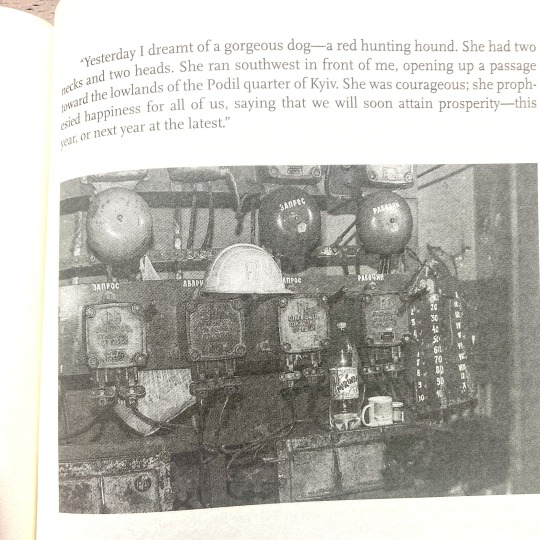
Yevgenia Belorusets, Lucky Breaks, translated by Eugene Ostashevsky
0 notes
Text
‘The Bridegrooms’
a poem by Daria Serenko translated from the Russian by Eugene Ostashevsky
When dead blue bridegrooms from Russia come back from the war they lie down forever in bed with their brides. They are lying between clean sheets as if they were lying in coffins and the still living women are lying next to them as if they were lying in coffins and all the people in every prefabricated concrete high-rise are lying as if they were lying in coffins.
And they are horrifying, these bridegrooms. They are not just blue and reeking like an abattoir, they also have individual injuries: the guts of one are hanging loose, half the face of another is baked together and runny, yet another is missing both legs. It is hard to love bridegrooms like these but it isn’t easy to bury them, either. The women sigh and lie down beside them, trying to conceal their revulsion because they feel pity. They have no more strength, no more tears, they don’t know what he died for, and it is not possible to ask or remember anymore whether he loved. Bridegrooms keep to themselves now, those who still have fingers can merely point soundlessly at something. The other day one was sitting with his mouth open and poking his finger at it. His bride thought he was asking for food, put a piece of bread soaked in milk under his swollen tongue, but the bread tumbled out unchewed.
Not much of a living can be made in the afterlife, so these days they put some of the funeral benefits aside for the wedding. A bit of bonuses, compensations, a drop of this, a drop of that, you survive. In the coming days this one couple—he dead, she living—will hold the wedding and the funeral reception together to avoid going through the expenses twice. First the bridegroom is mourned and then everybody congratulates the happy couple. Since the bride is at the same time a widow, she puts on a special ensemble: white dress with a black veil. Whereas the bridegroom is to be dressed in his father’s suit, the father got blown up back in Chechnya, but now the suit suits the son, the whole family is proud.
True, the brides are afraid to be left alone with their bridegrooms for the wedding night. For people are weak and it’s hard for the living to desire the dead. It’s as if you were betraying him, as he was when living, with the same him, who is now dead. It’s as if there were two separate human beings—the one living and the one dead. And you can’t choose between them anymore.
Of course the women would have preferred the living. It felt so good to kiss them under the apple blossoms in the first days of May. Or to save up together for a seaside vacation. Or to drink tea with rolls from the kiosk on the way to work. Or to send them to the all-night store for sprats in tomato sauce during the first pregnancy. At night, lying beside their immovable dead, they fantasize about the living. God be their judge.
Daria Serenko is a Russian poet, political activist, and cofounder of the Feminist Anti-War Resistance, which was formed in February to protest the Russian invasion of Ukraine. She was recently forced to leave Russia. (November 2022)
0 notes
Text
Winding Up the Week #216
Winding Up the Week #216
An end of week recap
“We must take sides. Neutrality helps the oppressor, never the victim. Silence encourages the tormentor, never the tormented.”
– Elie Wiesel
This is a weekly post in which I summarise books read, reviewed and currently on my TBR shelf. In addition to a variety of literary titbits, I look ahead to forthcoming features, see what’s on the nightstand and keep readers abreast of…

View On WordPress
#Dewithon22#1954 Club#Books#Dewithon 2022#Elie Wiesel#Eugene Ostashevsky#Reading#Reading Wales 2022#Richard King#Welsh Writers#Yevgenia Belorusets
0 notes
Text
The stars used to be on our side: Lucky Breaks by Yevgenia Belorusets
The stars used to be on our side: Lucky Breaks by Yevgenia Belorusets
@NewDirections #UkrainianLit
There is a very eerie atmosphere that envelopes the stories in Yevgenia Belorusets’ collection, Lucky Breaks. This is a collection that examines the impact years of covert military action on civilians, in this case the conflict in the impoverished Donbas region of eastern Ukraine that has been ongoing since 2014. But, by terrible coincidence, the release of this work in English came on the heels…
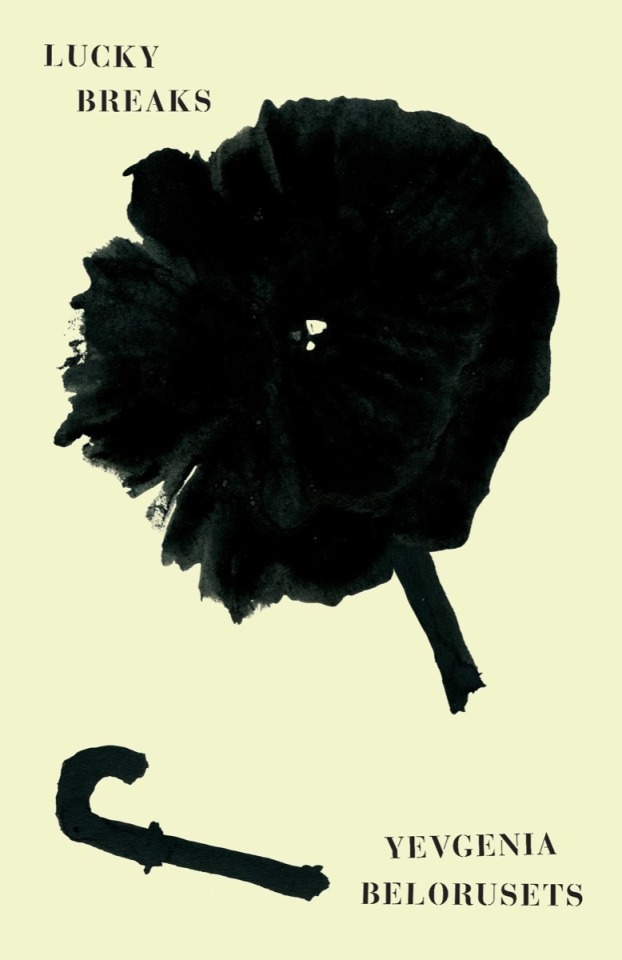
View On WordPress
#book review#books#Eugene Ostashevsky#literature#Lucky Breaks#New Directions#Russian#short stories#translation#Ukraine#Yevgenia Belorusets
0 notes
Text
The poem that changed Eugene Ostashevsky’s life
From a longer interview about Ostashevsky’s reading life, featured in today’s Shelf Awareness. We have two new books out from Eugene Ostashevsky: a book of poems, The Pirate Who Did Not Know the Meaning of Pi and a picture book, The Fire Horse: Children’s Poems by Vladimir Mayakovsky, Osip Mandelstam and Daniil Kharms, which he edited and translated.
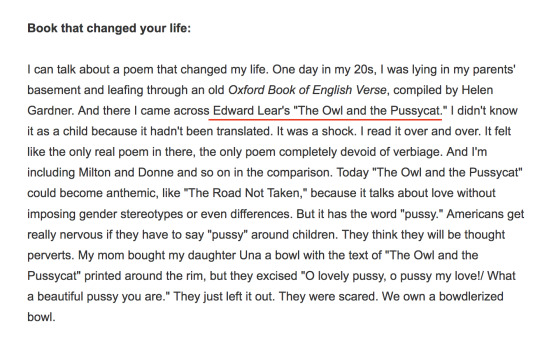

#Eugene Ostashevsky#The Fire Horse#russian literature#Soviet Literature#Poetry Month#The Poem that Changed My Life#Edward Lear#The Owl and the Pussycat#Shelf Awareness
9 notes
·
View notes
Text
Free & Inexpensive Reads - 10/19
Free/Pay-What-You-Can Ebooks
20 Atomic Sonnets by Rosebud Ben-Oni - free PDF (note: links directly to PDF)
The Woman Factory by Ava Hofmann - PDF free to download (donation suggested) - PDF free to download (donation suggested)
Hall Of Waters by Camellia-Berry Grass - PDF free to download (donation suggested)
Jazzercise Is a Language by Gabriel Ojeda-Sague - PDF free to download (donation suggested)
Love, Robot by Margaret Rhee - PDF free to download (donation suggested)
Marys Of The Sea (Second Expanded Edition) by Joanna C. Valente - PDF free to download (donation suggested)
La Comandante Maya by Rita Valdivia - PDF free to download (donation suggested)
Instructions Within by Ashraf Fayadh - PDF free to download (donation suggested)
Say / Mirror by JP Howard - PDF free to download (donation suggested)
Let It Die Hungry by Caits Meissner - PDF free to download (donation suggested)
... or any other of the latest digital chapbooks & PDFs of full-length print books from the Operating System
autobiography of a semiromantic anarchist by mónica teresa ortiz - free
The T(y)ranny by Alison Rumfitt - PWYC $0+
Sutures by Divya Viktor - free PDF
Remembrance of Things Plastic by Eléna Rivera - free PDF
the yet to be pronounced pronouns by j/j hastain - free PDF
dollop by Christina Svenson - PDF free to download (donation suggested)
HOLEPLAY by Dan Schapiro - PDF free to download (donation suggested)
CUD by Giulia Bencivenga - PDF free to download (donation suggested)
OIKOS by Chloe Tsolakoglou - PDF free to download (donation suggested)
Iterature by Eugene Ostashevsky - PDF free to download (donation suggested)
The Life and Opinions of DJ Spinoza by Eugene Ostashevsky - PDF free to download (donation suggested)
Inexpensive Ebooks
AMNESIA by Hal Y. Zhang - $2.99
Final Girl by Lauren Milici - $5+
Even the Milky Way is Undocumented by Amy Shimson-Santo - $5.99 (audiobook is on Hoopla)
Political AF: A Rage Collection by erica kaufman - $3.00
True Self by Lisa Ciccarello - $1.99
Pith by Tracy Fuad - $2.99
Water by Anna Morrison - $2.99
Small Press Ebooks (not on Amazon/Kobo/etc.)
ZOM-FAM by Kama La Mackerel
ZOETROPE by Kevin Latimer
The Incredible Shrinking Woman by Athena Dixon
Minerva the Miscarriage of the Brain by Johanna Hedva
Love & Solidarity by Brendan Joyce
Character Limit by Brendan Joyce
In the Sick Hour by Kaiya Waerea
Speech Therapy by Laura Surynt & Anju Gaston
Saturn Peach by Lily Wang
Small Press Audiobooks (not on Audible/Kobo/etc.)
Onyx by Faylita Hicks
A Jazz Funeral for Uncle Tom by Harmony Holiday
Futureless Languages by Cynthia Arrieu-King
Make Yourself Happy by Eleni Sikelianos
Flotsam Suite: a strange and precarious life, or how we chronicled the little disasters & I won’t leave the dance floor til it’s out of my system
by S*an D. Henry-Smith
The Elvis Machine by Kim Vodicka
Traveler's Ode by Dao Strom
Self-portrait as the space between us by Trace DePass
I'm From Nowhere by Lindsay Lerman
Lonesome Cowgirl by McKenzie Wark
The Sun and the Moon by Johanna Hedva
524 notes
·
View notes
Quote
Immigration is probably the most acute form of translation. I still translate myself regularly from country to country. As a poet, I translate words towards and away from one another, I make them close or distant, and I translate their meanings from what they are in the dictionary. As a translator of poetry, I work in the genre where meaning is most entangled with form, which is to say that I am a translator of the untranslatable.
Eugene Ostashevsky, from his blog entry on his collection “The Feeling Sonnets”, published at Carcanet Press, July 6, 2022
37 notes
·
View notes
Text
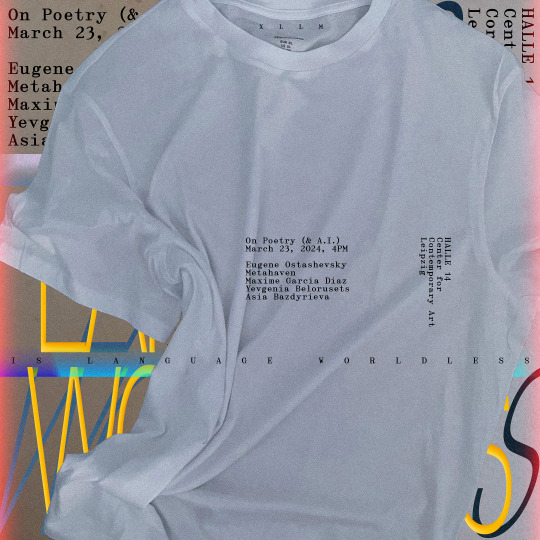
Is Language Worldless. On Poetry and Al–a symposium on poetry, language, embodiment, and LLMs with Asia Bazdyrieva, Yevgenia Belorusets, Maxime Garcia Diaz, Metahaven, and Eugene Ostashevsky–taking place in Leipzig at HALLE 14 on March 23, 2024, as part of the Leipzig Book Fair. In 2023, OpenAl, the company developing ChatGPT, published a list of human occupations that it predicts as endangered by the rise of Al. Topping the list of threatened vocations were poets. So, does a computationally optimized method for concatenating words–such as a Large Language Model–produce or understand poetry? For the Large Language Model, this may not matter as long as its output is aligned with its objectives. But as social and planetary technologies with transformative effects, Large Language Models have already entered a territory where their outputs are intentionally or accidentally conflated with human-made art or literature. Poets and screenwriters often emphasize embodied and situated understandings of poetics. Yet artificial intelligence points somewhere else. How might Al’s understanding of language affect the future of writing?
5 notes
·
View notes
Text
in the garden of phallic regalia
garden of addictions
you know, where the head bloom
blooms with overweening letters,
as I write you letters, hiding out in the thick gardens
-- Lolita Agamalova, from “Dilige, et quod vis fac”, translated from the Russian by Eugene Ostashevsky and Ainsley Morse
12 notes
·
View notes
Photo


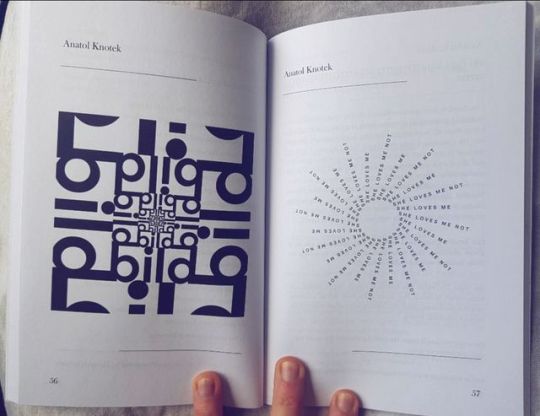

»E U R O P O E« an anthology of european poetry is out now!
groundbreaking poetry by sixty of europe’s most original poets, translated into english, brought together for one remarkable anthology.
kingston university press (may 2019)
edited by sj fowler
143 pages. paperback
available to buy here for GBP 9,99,-
“celebrating the grand resurgence in literary and avant-garde poetry that has marked the 21st century in europe, poets from over forty nations present works developing the lyric, sonic, visual, abstract and conceptual traditions. a volume that seeks not to offer a taxonomy but a brief glimpse of the brilliance of so many poets working at the forefront of the language arts, this is a book unified by a fidelity to that which is truly contemporary, amorphously continental and generously innovative.
featuring poems by pierre alferi, tomica bajsić aase berg, volodymyr bilyk, cecilie bjørgås jordheim, ida börjel, serena braida, kristian carlsson, sophie carolin-wagner, theodoros chiotis, iris colomb, efe duyan, federico federici, orsolya fenyvesi, mária ferenčuhová, frédéric forte, lies van gasse, pavlo grazhdanskij, ana gorria, joão luís barreto guimarães, max höfler, niillas holmberg, zuzana husarova, maja jantar, ragnhildur jóhanns, aušra kaziliūnaitė, frank keizer, anatol knotek, amadej kraljevič, gabrielė labanauskaitė, morten langeland, luljeta lleshanaku, léonce w. lupette, christodoulos makris, maria malinskovskaya, ricardo marques, immanuel mifsud, simona nastac, bruno neiva, eugene ostashevsky, eiríkur örn norðdahl, daniele pantano, astra papachristodoulou, cosmin perţa, jörg piringer, inga pizane, tomáš přidal, monika rinck, cia rinne, jon ståle ritland, ekaterina samigulina, martin glaz serup, ásta fanney sigurðardóttir, muanis sinanović, morten søndergaard, esther strauß, kinga toth, nadia de vries, krišjānis zeļģis.
europoe, edited by british poet sj fowler and presented by european poetry festival in the uk, showcases those who are often on the margins of their own nations literary culture, precisely because their work is forward-looking and challenging, alongside some of the most renowned names in europe. europoe is an anthology as a unique document of poetry, marking a moment in time for a modern, and thoroughly european, means of experiencing literature.”
55 notes
·
View notes
Link
But Musk and his colleagues should heed the warning that the Italian Futurist movement provides. This love of disruption and progress at all costs led Marinetti and his fellow artists to construct what some call a “a church of speed and violence.” They embraced fascism, pushed aside the idea of morality, and argued that innovation must never, for any reason, be hindered. Marinetti and his movement cheered, for example, when Italy invaded Northern Africa. “Italian bombardment of Tripoli from biplanes and dirigibles was the first air bombardment in the history of the world, and thus a major technological innovation,” writes Eugene Ostashevsky. Today, some technologists praise drone warfare with similar language. “Though they painted themselves as scions of a new age, the Fascists and Futurists were really ultraconservatives ideologically,” writes Gabriel T. Rubin. Again, sound familiar? In their never-ending quest for progress at any cost, today’s companies are flirting with fascism themselves.
I invite you to read this article alongside this NY Mag article about Martine Rothblatt, formerly Martin Rothblatt, the now transwoman founder of Sirius XM, who is often cited as the “highest paid female CEO”. Rothblatt is well-known for not only being a entrepreneur but for her commitment to transhumanist thought; she often makes the news for her religious transhumanist organization, the Terasem Movement, which advocates for extending human life through transferring consciousness outside the body, and for her attempt to make a sentient robot that is a perfect mimic both physically and “mentally” of her wife (known as BINA48). Rothblatt founded a biotechnology company (United Therapeutics) specializing in transplantation technology, including research into manufacturing human-compatible organs by cloning pigs. Rothblatt is often praised for charitably founding this company after her daughter was diagnosed with a life threatening lung disease, but United Therapeutics was recently sued for creating contracts with suppliers that blocked the release of a generic version of the same life-saving drug used to treat his daughter’s condition.
While I don’t support the Federalist’s disruptive right-wing agenda, this piece on their website by the deplatformed feminist Jennifer Bilek is one of the most comprehensive articles tracking the very wealthy male people funding transgender causes, which tend not to include direct and effective medical assistance to transgender people nor advocacy for the real human rights issues that severely gender non-conforming people face, but instead lobbying for laws that obfuscate sex-based rights and the creation of capitalist medical infrastructure that affirms the gender related lifestyle choices that older, usually white males make, expanding the elective medical services market to new populations (such as children and lesbians). She notes Martine Rothblatt, among others, being one of the billionaires both financially and personally invested in the expansion of medical technology companies and pharmaceutical markets, who can “pull strings” behind the public scenes among upper class political and business networks to advance her favorite causes.
I leave you with this quote from the NY Mag article, from Rothblatt’s son, Gabriel, which should chill you given Rothblatt’s simultaneous power and hubris and the history recorded above of people who have believed intensely that human limitations were an unfair restriction on their infinite wills, to be broken as a matter of principle. If you are transgender I ask you to think very carefully about whether this philosophy and its historical precedent is something you wish to guide legal advocacy for your rights and the medical infrastructure that you must interface with to access gender transition:
As adults, the siblings have hashed over Martine’s choice, Gabriel says. If genitalia aren’t defining, then why put yourself and the people you love through such a painful process? Gabriel says he long ago made peace with Martine’s decision: “She did what she felt was right, the right choice for her.” But he also sees that it may have sprung as much from her lifelong determination to cross all borders as from a compulsion that was bred in the bone. “Sometimes it’s necessary to be a living example,” Gabriel told me. “If the point was just rhetorical, if this was just some philosophical scrabbling, the message wouldn’t have been as strong.” Then he brings up what he calls the familiar joke about why the libertarian chicken crossed the road. “The libertarian chicken dreams of the day when no one asks them why they crossed the road. It’s your body. It’s your choice what you choose to do with it. It’s not even our place or our business to be judging them or asking them why.”
26 notes
·
View notes
Text
The Feeling Sonnets by Eugene Ostashevsky
1.
It is with profound ambivalence that we inform you of our feelings.
We read feelings as a victory of the particular over the universal.
We cannot read feelings as there are always feelings between feelings and under feelings.
If we read feelings they would be called readings. Feelings are what we feel.
Can we name feelings and do they respond to their name.
The name feeling suggests there is something to feel for here.
Does it give us hearing. Is it even here.
If it is not here is it even there.
Also if a feeling responds to a name does it correspond to the name.
Or is to respond to a name to correspond to it in part and in part to part from it.
Or is correspond what it takes two to, when not there to give one another hearing.
To give one another hearing we repeat once more with feeling.
Here are our rings taken off, here we lie to play, we play with feeling.
Where can we read if the name of the feeling we play with corresponds to the feeling.
2.
We ask if we feel the feelings that we call ours.
Feelings fork like the capillaries of a leaf in the forest.
We feel this forest is special. It is formed of numbers.
Between one tree and another there always is a third. This is why it is called forest.
As for number, is it so named because it is numb.
Between numb and numbest, there it is. Nonetheless it too is a limit.
No one has ever held or beheld a limit, uncoiled the leaf to roll out the life of its color all over the fingertips. That was a pleasing sentence.
The outlines of our feelings lie without the amens of our names.
If the forest is dense then the numbers are real.
If the numbers are real then the feeling is squeezed.
If the feeling is squeezed then the feeling is crushed.
If the feeling is crushed then the feeling is stifled.
If the feeling is stifled it touches no one.
If it touches no one there is no one feeling.
4.
We are trying to make sense of a feeling.
Making sense of a feeling is like building a boat from water.
Feeling is a field. It is uneven. None of its points is like any other.
A field of what. A field of being afield. Afield of what. Afield of being a field.
Or feeling is fieldwork. For it involves an other.
When it does not involve another, it is called fooling.
Even when it does involve another, it may still be called fooling.
It never fully involves another.
To fight against fooling we think of feeling as feeling about.
Feeling about means trying to touch the object of your feeling.
It is often done in the dark. We feel about when we cannot see and grasp.
How do we feel about each other.
We feel for each other. We feel for each other in the dark.
We feel for each other in the dark, trying make sense of the feeling.
0 notes